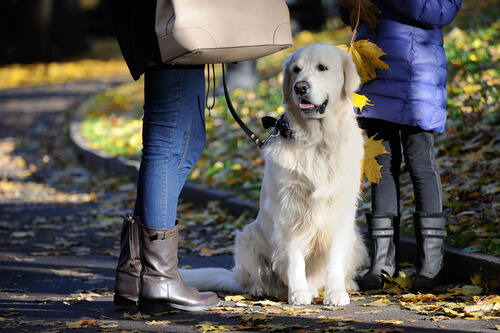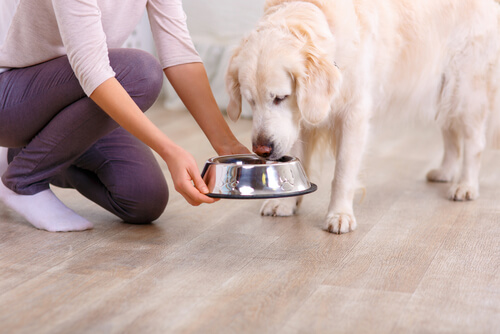How to Keep Your Dog From Eating Things Off the Ground

When you take your dog out on walks, you have to be very attentive because it is likely that they will try eating things off the ground.
Dogs don’t understand that it can be bad for them; it’s just instinct. That’s why we humans must do everything in our power to change this habit in our dogs. In this article, we’re going to tell you how.
Why is My Dog Eating Things Off the Ground?
If you live in the city and take your dog out on a walk every afternoon, pay close attention and keep him from sniffing or eating things off the ground, like trash, dirt, other animals’ feces, food in poor condition, toxic waste…
All of these are very attractive to your furry friend. Here are a few reasons why your dog might be eating things off the ground.
1. To get your attention

If your dog knows that you’ll talk to them or look at them for this behavior, they’ll continue to do it until they achieve their goal: getting your attention.
For example: if you take your dog out for a walk and you’re constantly looking at your phone or talking to a friend, your dog will feel “betrayed”. So, try to interact with your dog and congratulate them for their good behavior.
2. They want to eat
It is absolutely true that dogs want to eat 24 hours a day, even when they just finished a meal. However, sometimes we accidentally don’t feed them enough and this is why they look for food elsewhere. The dog food you’re feeding them may even be of poor quality and thus not giving them the nutrients they need.
3. They’re following their instincts
Even though dogs have long been domesticated by man, they maintain their wild instinct that pushes them to look for food, defend themselves and want to be in a pack. As part of their natural behavior, they will be watchful for any food source, whether it’s on a walk or at home.
4. They’re curious
This is especially common in puppies, since they are amazed by pretty much everything they see. For example, they’ll be attracted by a colorful bag on the street, a child who’s dropped ice cream in the park, other animal’s feces if there are any, etc.
Pay close attention when you take your dog out on walks because otherwise they’ll be eating things off the ground.
Tips for Keeping Your Dog from Eating Things Off the Ground
First of all, even if their instincts lead them to rummage in the trash or beg for more food as soon as they finish eating, dogs can be trained to behave well both inside and outside of the home.
They can be taught to not consume anything that could be harmful to their health. Here are some tips for keeping your dog from eating things off the ground.
1. Only allow your dog to eat from their bowl

This way, they will relate food with their bowl and won’t be as interested in food scattered on the floor. This habit is excellent for getting your dog used to always eating at home and not outside or on walks. When your dog finishes their food, don’t forget to praise them.
2. Say “NO” when your dog is eating things off the ground
When you’re walking down the street and your dog stops in front of something with the intention of eating it, it’s best for you to move your dog away forcefully. It’s unhelpful to punish your dog when you get home.
You must reprimand them right when they make the mistake by giving a firm “no.” Your dog will understand it right away. However, remember that the process takes time and you must have patience.
3. Divide up your dog’s meals
It’s not good for your dog to eat only once a day. Why, might you ask? Well, because there will be quite a few hours before their next meal. Naturally, they’ll get hungry. That’s why your dog stops to eat whatever is in front of them.
It’s also likely that a dog will eat very quickly if you only feed them once a day, and this is bad for their digestive system. Therefore, the same amount of food divided into two meals per day (for example, morning and afternoon or noon and night) will be better.
This text is provided for informational purposes only and does not replace consultation with a professional. If in doubt, consult your specialist.